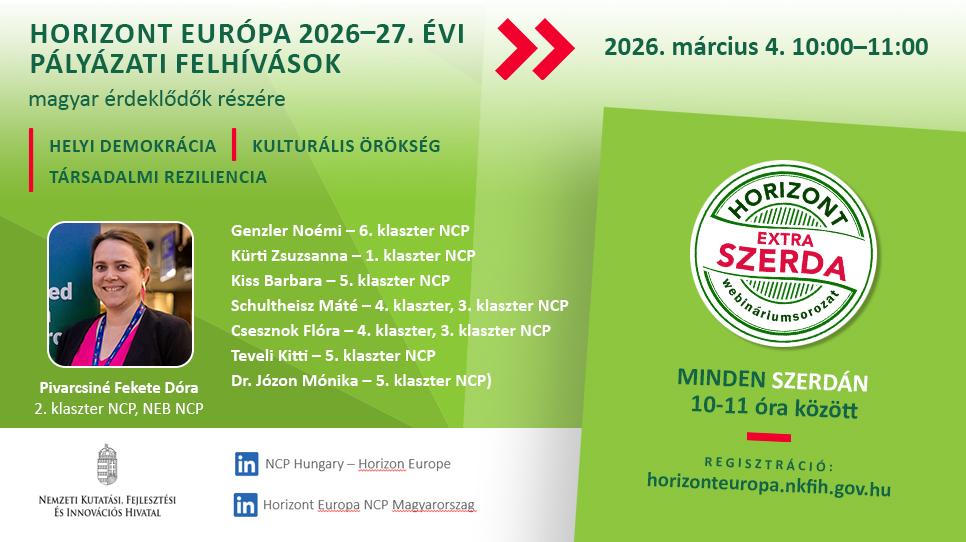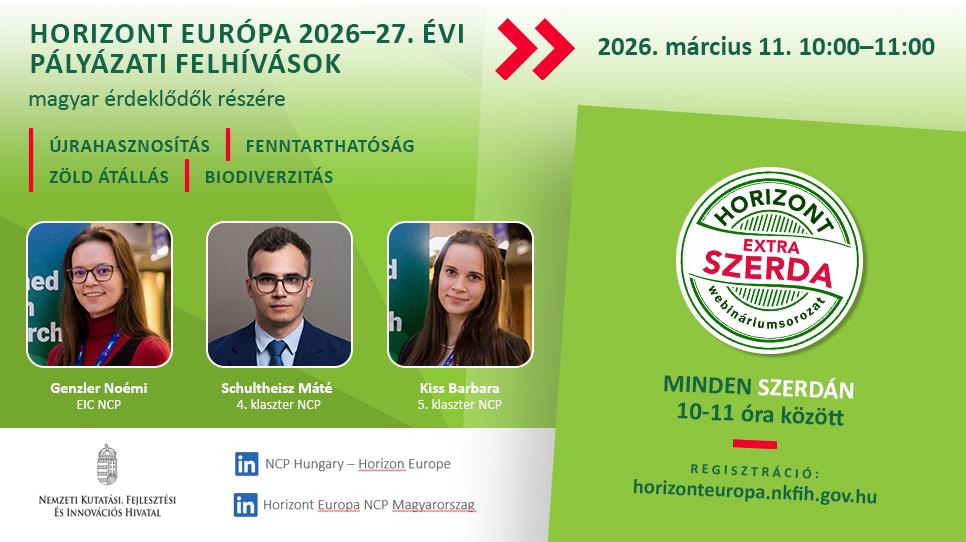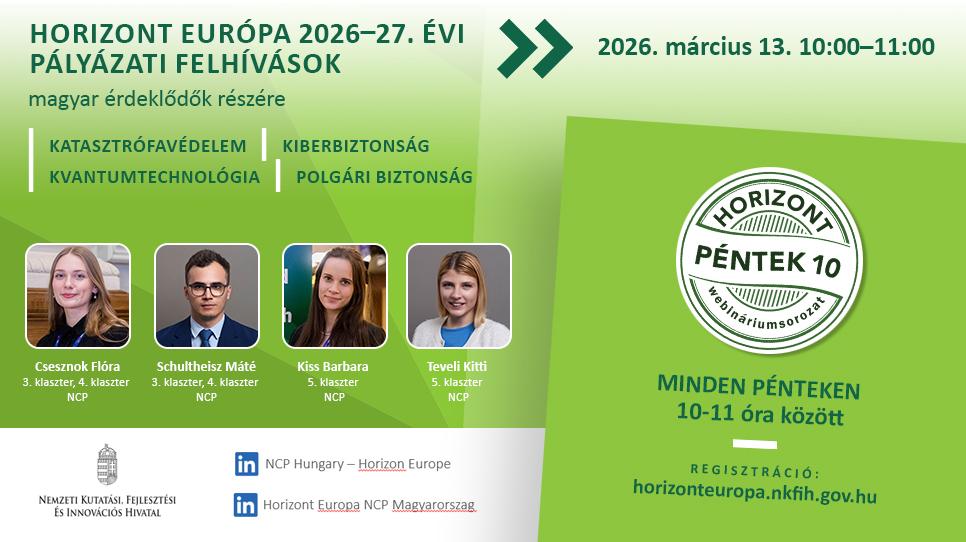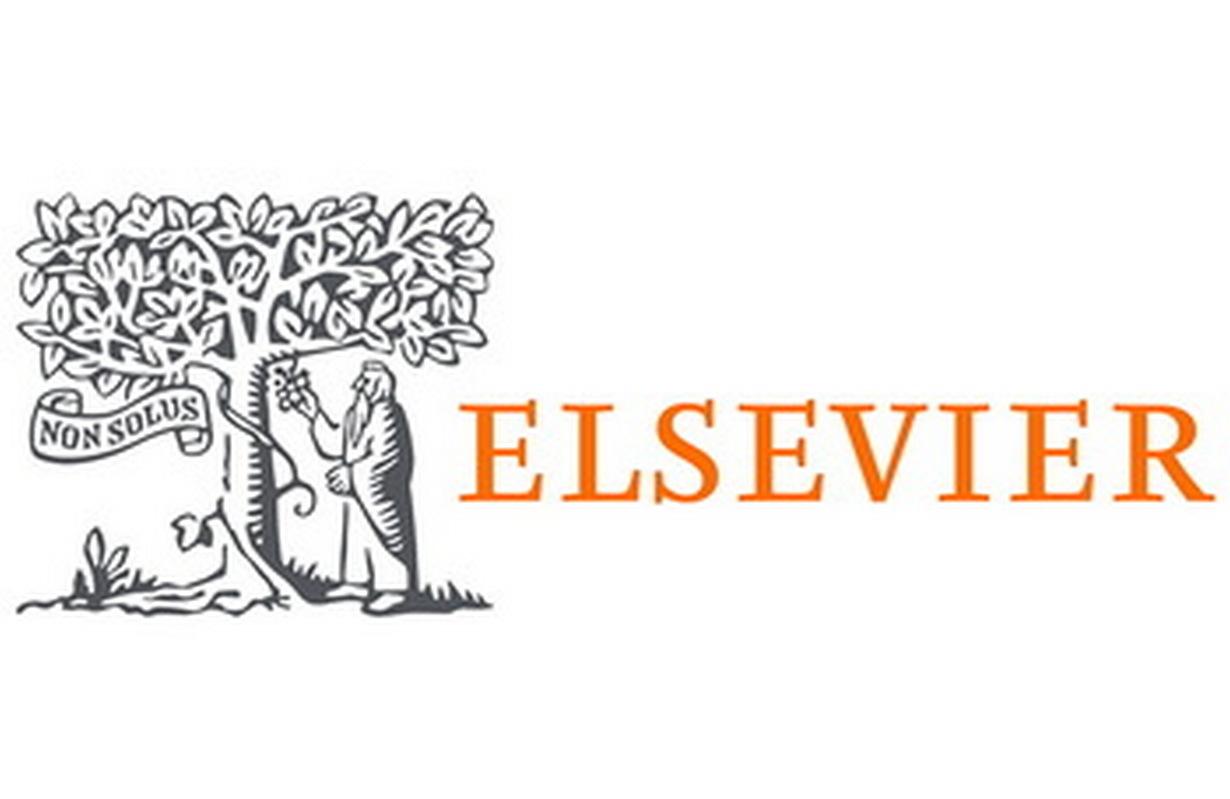Kutatástámogatási tréningek
Az alábbiakban az NKE kutatók érdeklődésére számot tartó adatbázishasználati bemutatók, publikálásmódszertani tréningek és és kutatástámogatási előadásokra szóló meghívók kerülnek megjelenítésre.
Horizont Extra Szerda - A Horizont Európa keretprogram társadalomtudomány témaköréhez kapcsolódó 2026-27. évi felhívások2026. március 04. (szerda) - 10:00 - 11:00 (online) Időtartam: 1 óra Nyelv: magyar A Horizont Extra Szerda az NKFIH Horizont Európa NCP csapatának a Horizont Európa keretprogram érdekes témáiról, aktuális felhívásairól áttekintést, gyakorlati ismereteket nyújtó heti HorizontPéntek10 webinársorozatát kibővítő rendezvénye. A Horizont Európa keretprogram számos alprogramjában jelennek meg társadalomtudományi témakörök. A 2. klaszter demokrácia, kulturális örökség és társadalmi-gazdasági átalakulások témacsoportjai mellett a New European Bauhaus kezdeményezés és a keretprogram II. pillére alá tartozó összes klaszter tartalmaz társadalomtudományi kapcsolódást, legyen szó akár az egészségügy, a digitális technológiák, az energia, vagy a mezőgazdaság területéről. Regisztrációs határidő: 2026. március 3., 12:00 óra |
|
HorizontPéntek10 - Körforgásos gazdaság témájú felhívások a 2026-27. évi Horizont Európa munkaprogramokban2026. március 11. (szerda) - 10:00 - 11:00 (online) Időtartam: 1 óra Nyelv: magyar A Horizont Extra Szerda az NKFIH Horizont Európa NCP csapatának a Horizont Európa keretprogram érdekes témáiról, aktuális felhívásairól áttekintést, gyakorlati ismereteket nyújtó heti HorizontPéntek10 webinársorozatát kibővítő rendezvénye. A 2026–2027. évi Horizont Európa munkaprogramok számos, a körforgásos gazdaság témájához kapcsolódó pályázati felhívást tartalmaznak, különös tekintettel az újrahasznosításra, a fenntarthatóságra, a zöld átállásra és a biodiverzitás megőrzésére. A releváns felhívások a Horizont Európa 6. és 4. klaszterében, az Európai Innovációs Tanács (EIC) programjában, valamint a Driving Urban Transitions (DUT) partnerség keretében érhetők el. A webinárium célja, hogy átfogó képet adjon a 2026–2027. évi munkaprogramok körforgásos gazdasághoz kapcsolódó pályázási lehetőségeiről, bemutassa az egyes programok és partnerségek főbb fókuszterületeit, valamint hogy segítséget nyújtson az érdeklődők számára a számukra releváns pályázati felhívások azonosításában és megértésében. Regisztrációs határidő: 2026. március 10., 12:00 óra |
|
How to Do Research and Get Published - How to Deal with Rejection2026. március 11. (szerda) - 16:00 (online) Language: English Rejection is a common part of academic life. This session explores how to process and learn from rejection and offers tools for resilience, revision, and moving forward with confidence. Attendees will gain practical strategies for interpreting feedback constructively, maintaining motivation, and developing a growth mindset that transforms setbacks into opportunities for improvement. |
|
HorizontPéntek10 - A 2026-2027. évi katasztrófavédelem, kiberbiztonság és kvantumtechnológia témájú felhívások a Horizont Európa keretprogramban2026. március 13. (péntek) - 10:00 - 11:00 (online) Időtartam: 1 óra Nyelv: magyar A HorizontPéntek10 webinársorozat az NKFIH Horizont Európa NCP csapat heti rendezvénye, melyen a Horizont Európa keretprogram érdekes témáiról, aktuális felhívásairól nyújtunk áttekintést, gyakorlati ismereteket minden héten. A webinárium alkalmával a 2026-2027. évi katasztrófavédelem, kiberbiztonság, illetve kvantumtechnológia témájú felhívásokat mutatjuk be a Horizont Európa keretprogram különböző területeiről. A 3. klaszter (Polgári biztonság a társadalomért) felhívásai mellett bemutatásra kerülnek a 4. klaszter biztonsággal kapcsolatos témái, illetve a kvantumtechnológiával foglalkozó felhívások, továbbá az 5. klaszter mobilitáshoz kapcsolódó pályázati lehetőségei, illetve a Klíma misszió is. Regisztrációs határidő: 2026. március 12., 12:00 óra |
|
Getting started with SciVal - An overview!2026. március 17. (kedd) - 10:30 (online) Language: English Not sure where to start with SciVal? This online training will introduce an overview and key features of Elsevier’s research intelligence platform SciVal, a tool that provides access to research analytics data. Used in the right context, SciVal can help you track Institutional Performance, track the impact of your Institutions publications and identify potential collaborators. The webinar will be useful for researchers and faculty members, as well as administrative staff members, research managers, and librarians, who would like to start using SciVal or to refresh their knowledge. |
|
Research Communication Lab 3: Fundamentals of research integrity & publishing ethics2026. március 18. (szerda) - 08:00 (online) Language: English This workshop explores research integrity and publishing ethics, addressing common issues like authorship, AI use, and post-publication notices. Participants will understand ethical practices, avoid submission issues, and learn acceptable AI uses in scholarly publishing. This webinar is part of The Research Communication Lab, a year-long, 11-part program designed to help researchers navigate scholarly publishing and maximize their impact. Open to all, it includes monthly live sessions, pre-recorded content for flexible learning, and covers topics like academic writing, peer review, publishing ethics, research data management, and using social media for visibility. |
|
Research Communication Lab 3: Fundamentals of research integrity & publishing ethics2026. március 18. (szerda) - 17:00 (online) Language: English This workshop explores research integrity and publishing ethics, addressing common issues like authorship, AI use, and post-publication notices. Participants will understand ethical practices, avoid submission issues, and learn acceptable AI uses in scholarly publishing. This webinar is part of The Research Communication Lab, a year-long, 11-part program designed to help researchers navigate scholarly publishing and maximize their impact. Open to all, it includes monthly live sessions, pre-recorded content for flexible learning, and covers topics like academic writing, peer review, publishing ethics, research data management, and using social media for visibility. |
|
Web of Science Open House Session2026. március 18. (szerda) - 15:00 - 16:30 (online) Language: English The Web of Science Open House Sessions are a series of webinars where the Web of Science Editorial Team provides an inside view of the journal evaluation process and selection criteria, a robust process that makes the Web of Science Core Collection the world’s most trusted publisher-independent global citation database. Our Content Operations Publisher Outreach Team will also walk through the requirements for the Technical Evaluation and ongoing acquisition of content. As the sessions are public and general in scope, questions regarding specific journals (like status of evaluation, ranking, coverage decisions, etc.) will not be addressed. |
|
PhD Program: Smart Literature Review and Staying Current2026. március 23. (hétfő) - 10:00 - 11:00 (online) Language: English By the end of this session, PhD candidates will be able to:
|
|
Introduction to Scopus2026. március 24. (kedd) - 10:30 (online) Language: English Scopus is the world’s largest abstract and citation database of peer-reviewed literature. You have direct online access to content from over 7,000 publishers via discovery & analytical tools. It’s the perfect and easy way to track who is doing what research and where. In this session, we will show you how to use it to track your organization’s progress and impact with confidence with expert-curated affiliation profiles and help researchers showcase accomplishments, explore collaborators and inform funding and promotion proposals with best-in-class researcher profiles. |
|
Mastering the Engineering Publication Journey: From Submitting to Publishing your Research2026. március 25. (szerda) - 10:00 (online) Language: English Join us for an engaging webinar tailored specifically for engineers and engineering researchers, where you’ll learn essential skills for writing and structuring compelling academic manuscripts and gain insights into the peer review process. This session will break down the manuscript writing process into manageable steps, offering practical tips to enhance clarity and impact. Additionally, you’ll discover how to conduct effective peer reviews, understand journal editors’ expectations, and navigate research ethics. Enhance your professional skills and make a significant impact in the engineering research community. |
|







